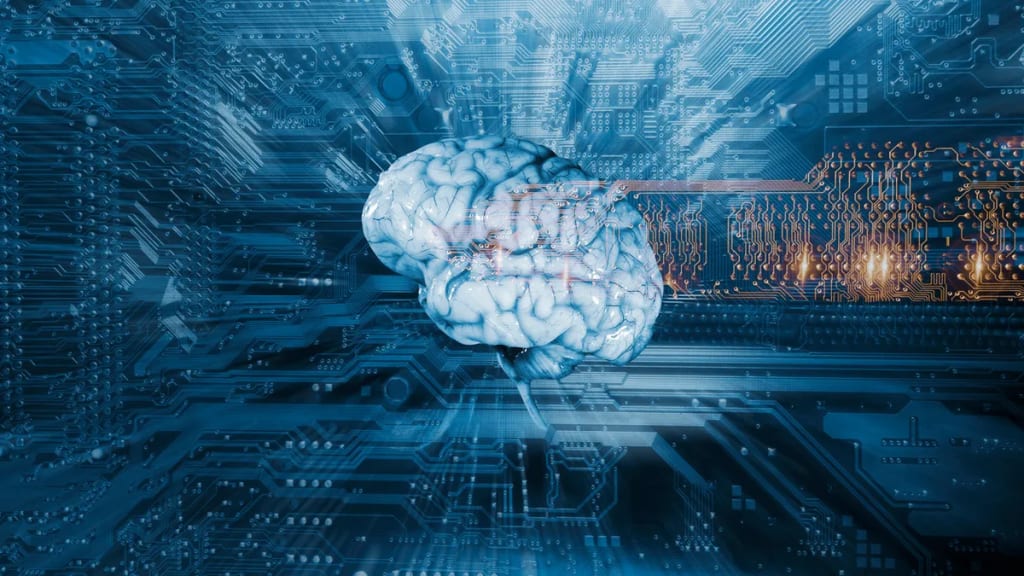A scientist claims that humans will be able to upload consciousness to a computer by the end of this year!
A computer scientist is urging the world to record voices and videos of their elderly parents and loved ones as consciousness is expected to be uploaded to a computer this year.

Dr Prateek Desai, who has founded several startups in Silicon Valley AI, said that if people have enough video and audio recorders for their loved ones, there is a "100% chance" that the relatives will live with you forever.
"This should be possible by the end of the year," Desai, who created his own ChatGPT-like system, wrote on Twitter.
Many scholars believe that the rapid developments in artificial intelligence, driven by ChatGPT, are poised to usher in a new golden age for the technology.
However, the world's greatest minds are divided over technology - Elon Musk and more than 1,000 leaders are calling on technology to stop, warning that it could destroy humanity.
On the other hand, there are other experts, like Bill Gates, who believe that AI will improve our lives — and others seem warm to the idea that it will help us live forever.
Desai stands by Gates, believing we can recreate simulations of our dead loved ones in a computer.
The process will involve digitizing videos, audio recordings, documents and photos of the person, then feeding an AI system that learns everything it can about the individual.
Users can then design a specific avatar that looks and behaves exactly as their living relative did.
The project, called Live Forever, creates a VR robot of a person with the same speech and behaviors as the person it's tasked with replicating.
He told Artur Sychov, founder of Live Forever in 2022 that he expected the technology to take off in five years, but due to recent developments in artificial intelligence, he expected it to be only for a short period of time.
"We can take this data and apply AI to it and recreate you as an avatar on your piece of land or within your NFT world, and people will be able to come and talk to you," Sychoff told Motherboard.
And you will meet the person. And maybe for the first 10 minutes while you're talking to this person, you won't know it's actually an AI. That's the point.
Another AI company, DeepBrain AI, has created a memorial hall that allows people to reunite with their deceased loved ones in an immersive experience.
The service, called Rememory, uses photos, videos and a seven-hour interview with the person while they are still alive.
The AI-powered virtual person is designed with deep learning techniques to capture an individual's appearance and voice, which is displayed on a 400-inch screen.
Desai didn't give too many details about his idea of the technology, but former Google engineer Ray Kurzweil is also working on a digital afterlife for humans - specifically to resurrect his father.
Kurzweil, 75, said his father died when he was 22 and he hopes to one day talk to him with the help of a computer.
Kurzweil said he has hundreds of boxes containing documents, recordings, films and photos of his father, which he is digitizing.
"A very good way to express all of these documents is to create an avatar so that the AI can be as much like my father as possible, given the information we have about him, including his DNA," Kurzweil said.
The scientist went on to explain that his digital father would be subjected to the Turing test, a test of a machine's ability to exhibit intelligent behavior equivalent to, or indistinguishable from, human behaviour.
"If an entity passes the Turing test, let alone a specific person, then that person is conscious," Kurzweil said.
Kurzweil was hired by Google in 2012 to "work on new projects involving machine learning and language processing," but he was predicting technological advances long before that. Source: Daily Mail
Reports reveal that Google employees are trying to prevent the launch of ChatGPT competitor!
The New York Times, citing sources familiar with the process, revealed that two employees in Google's responsible innovation department tried and failed to prevent the launch of Bard chatbot last month.
They warned that he was vulnerable to "inaccurate and dangerous statements".
Already apprehensive product reviewers noticed problems with large language models of artificial intelligence such as Bard and its main competitor ChatGPT when Google's chief lawyer met with search and safety executives to tell them that the company was prioritizing AI over everything else.
The sources claimed that the couple's concerns about the chatbot producing false information, harming users who had become emotionally attached, or even unleashing "technology-facilitated violence" through artificial mass harassment were later downplayed by the responsible innovation supervisor, Jane Jinai. . And while the reviewers urged Google to wait before launching Bard, Jenai allegedly edited their report to remove that recommendation entirely.
Jenai defended her actions to the Times, pointing out that the reviewers weren't supposed to share people's opinions on whether or not they should go ahead, because Bard was just an experiment. It claimed to have improved the report, having "corrected inaccurate assumptions, and already added more risks and harms that need to be studied". This, she insisted, made the final product safer.
Google credited Genai for its decision to release Bard as a "limited trial," but the chatbot is still set to fully integrate with Google's market-dominant search engine "soon," according to Google's own website.
Google has succeeded in eliminating employee rebellions on the issue of artificial intelligence before. Last year, it fired Blake Lemoine, after he claimed that LaMDA (Language Model for Dialogue Applications) had become sentient, while researcher Mahdi Elmohamady resigned after the company prevented him from publishing a paper warning of cybersecurity vulnerabilities in large language models such as Bard. And in 2020, AI researcher Timnit Gebru was let go, after publishing research accusing Google of not being careful enough about AI development.
However, a growing faction of AI researchers, technology executives, and other influential futurists have influenced the rapid "advancement" of Google and its competitors in Microsoft and OpenAI so that effective safeguards can be imposed on the technology. A recent open letter calling for a six-month suspension of "giant AI experiments" attracted thousands of signatories, including OpenAI co-founder Elon Musk and Apple co-founder Steve Wozniak.
The technology's ability to upend society by rendering many human professions (or humans themselves) obsolete is central to the warnings of many experts, although lesser risks such as data breaches - which have already occurred in OpenAI - are commonly cited. frequent. Source: RT
Russia is building facilities to develop new generations of helicopters and drones
Russia's Rostec Corporation announced that it has started constructing new buildings and facilities for the development of helicopters and advanced drones.
A statement issued by the Corporation stated: “The Russian Helicopters Holding Company, affiliated to our Corporation, has begun the construction of a new building at the Reduktor-PM Corporation in Perm, Russia. In this building, equipment for promising helicopters and drones will be developed and tested. This will help increase the production of these aircraft, and will expand the range of Our products. It is assumed that the construction and equipment works for this building will be completed in 2025.”
"The ceremony of laying the foundation stone for the new building was attended by the governor of Perm province, Dmitry Makhonin, the head of the aviation technology department in Rostec, Anatoly Serdyukov, and the vice president of the Russian Helicopters holding, Mikhail Rybakov," the statement added.
About the project, the governor of Perm province, Dmitry Makhonin, said: "The new building will become one of the most modern and advanced facilities, and a unique place for the development of the aviation industry in Russia.. Over the past years we have raised more than 700 million rubles through the federal and regional industrial development fund with the aim of supporting the aviation industry." "We have a systematic plan to support this industrial sector, we are training staff and technicians, building new laboratories, improving training programs for this field. With the construction of the new building, Perm will become an important center for the aviation industry in Russia."
It should be noted that Russia has been working effectively over the past years to develop the aviation industry sector, and has a plan to secure the independence of this industry and abandon the foreign products that enter it. Source: Russia's weapon
About the Creator
News Correct
Information WorldWide MORE INFORMATION






Comments
There are no comments for this story
Be the first to respond and start the conversation.